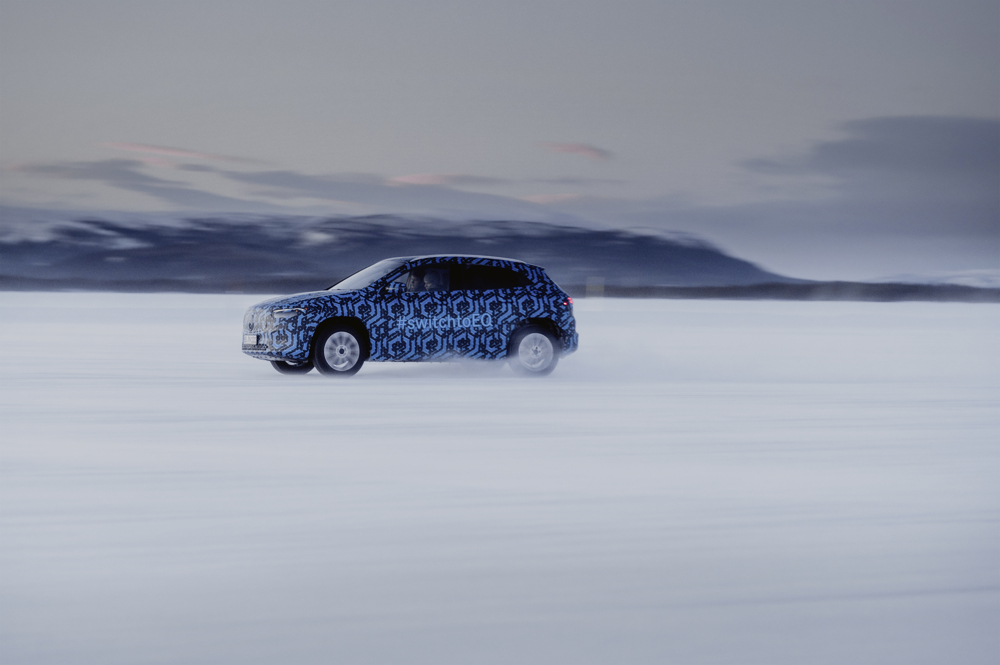The EQA in winter testing and new plug-in hybrids at the Geneva Motor Show

With the Concept EQA at the 2017 IAA International Motor Show in Frankfurt, Mercedes-Benz demonstrated how the EQ strategy can be transferred to the compact class. The production version of the all-electric sibling of the GLA will have its première before the end of the year. Prototypes of the EQA are currently undergoing challenging winter trials in the far north. And Mercedes-Benz will complete the EQ Power family of compacts with additional sporty models featuring the third-generation hybrid powertrain.
The new GLA rounds off the current compact car generation from Mercedes-Benz as the eighth model. An electric-model in the form of EQA will follow before the year is out. Prototypes are currently travelling the snow-covered roads of Sweden. This winter testing sees the engineers paying particular attention to the thermal management of the battery and the interior, and to charging in the cold. Further aspects are driving safety, traction and energy recovery on ice and snow.
At the same time, Mercedes-Benz Cars is expanding its line-up of plug-in hybrids under the EQ Power label and will present additional models with the third-generation hybrid powertrain at the Geneva Motor Show. For the new compact vehicles with EQ Power, (electric) driving pleasure and suitability for everyday use are to the fore.
Transparency for e-mobility
One key aspect of the sustainable business strategy of Daimler AG is electric mobility. With its “Ambition 2039” initiative, Mercedes-Benz is working towards being able to offer a CO2-neutral new car fleet in 19 years’ time. One important aspect of sustainable mobility is transparency. This is why Mercedes-Benz AG is the first premium automotive manufacturer to have had its climate protection objectives scientifically verified by the Science Based Targets Initiative (SBTI). This means that the company is in line with the requirements of the Paris World Climate Accord.
Live online: world premiere of new models from the family of compact plug-in hybrids at the 2020 Geneva Motor Show
The Mercedes-Benz press conference on the first press day, 3 March 2020, begins at 8:30 a.m. (CET) and can be experienced online from various perspectives in full length in the multi-angle live stream on Mercedes me media: https://media.mercedes-benz/gims2020. The complete media special for the Geneva 2020 motor show can also be found there.
Further information about Mercedes-Benz is available online at www.mercedes-benz.com.
You can also learn about current Mercedes-Benz Cars & Vans topics and events on our Twitter channel @MB_Press at www.twitter.com/MB_Press
Mercedes-Benz AG is responsible for the global business of Mercedes-Benz Cars and Mercedes-Benz Vans with over 173,000 employees worldwide. Ola Källenius is Chairman of the Board of Management of Mercedes-Benz AG. The company focuses on the development, production and sales of passenger cars, vans and services. Furthermore, the company aspires to be a leader in the fields of connectivity, autonomous driving and alternative powertrains with its pioneering innovations. The product portfolio comprises the Mercedes-Benz brand with the sub-brands Mercedes-AMG, Mercedes-Maybach and Mercedes me, as well as the smart brand and the EQ product and technology brand for electric mobility. Mercedes-Benz AG is one of the largest manufacturers of premium passenger cars. In 2019, the company sold nearly 2.4 million cars and over 438,000 vans. In its two business segments, Mercedes-Benz AG is continually expanding its worldwide production network with over 40 production sites on four continents, while gearing itself to meet the requirements of electric mobility. At the same time, the company is constructing its global battery production network on three continents. Sustainable actions play a decisive role in both business segments. To the company, sustainability means creating lasting value for all stakeholders: customers, employees, investors, business partners and society as a whole. The basis for this is Daimler’s sustainable business strategy. In it, the company takes responsibility for the economic, ecological and social effects of its business activities and looks at the entire value chain.